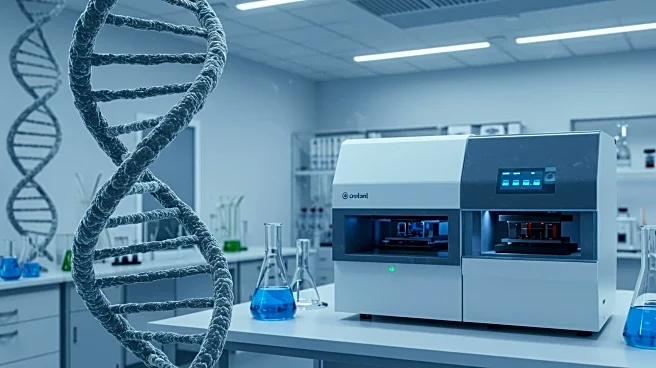What is the story about?
What's Happening?
The U.S. clinical laboratory services market is experiencing significant growth, driven by the adoption of next-generation sequencing (NGS) technologies. NGS is revolutionizing clinical laboratories by enabling rapid and comprehensive analysis of genetic material, which is crucial for understanding the genetic basis of diseases and facilitating targeted medicine. This technology is particularly beneficial in oncology, where it aids in identifying genetic mutations that drive cancer progression and supports data-targeted treatment approaches. The integration of NGS into routine clinical practice has led to the development of advanced diagnostic tests that can detect a wide range of genetic disorders. These tests are becoming increasingly accessible due to advancements in sequencing technology and cost reductions. As a result, NGS is poised to become a standard tool in clinical laboratories, offering unprecedented opportunities for early disease identification and personalized treatment.
Why It's Important?
The growing adoption of NGS in clinical laboratories is set to transform the healthcare landscape by enhancing diagnostic accuracy and enabling personalized medicine. This shift is expected to improve patient outcomes, particularly in areas like oncology, where precise identification of genetic mutations can lead to more effective treatment plans. The projected growth of the U.S. clinical laboratory services market to $16.18 billion by 2034 underscores the increasing demand for advanced diagnostic technologies. As NGS becomes more integrated into clinical practice, healthcare providers can offer more tailored and efficient care, potentially reducing healthcare costs and improving the overall quality of care. This development also positions the U.S. as a leader in medical innovation, with significant implications for public health readiness and response.
What's Next?
The continued integration of NGS into clinical laboratories is expected to drive further advancements in diagnostic tests and personalized medicine. As these technologies become more accessible, healthcare providers may increasingly rely on NGS for routine diagnostics, leading to more widespread adoption across various medical fields. Additionally, the expansion of NGS capabilities could spur further innovation in related areas, such as bioinformatics and genetic research. Stakeholders, including healthcare providers, policymakers, and technology developers, will likely focus on optimizing the use of NGS to enhance patient care and streamline healthcare delivery.
Beyond the Headlines
The adoption of NGS in clinical laboratories raises important ethical and legal considerations, particularly regarding genetic privacy and data security. As these technologies become more prevalent, there will be a need for robust policies to protect patient information and ensure ethical use of genetic data. Additionally, the widespread use of NGS could lead to shifts in healthcare practices, emphasizing preventive care and early intervention. This could result in long-term changes in how diseases are managed and treated, potentially reducing the burden on healthcare systems.















